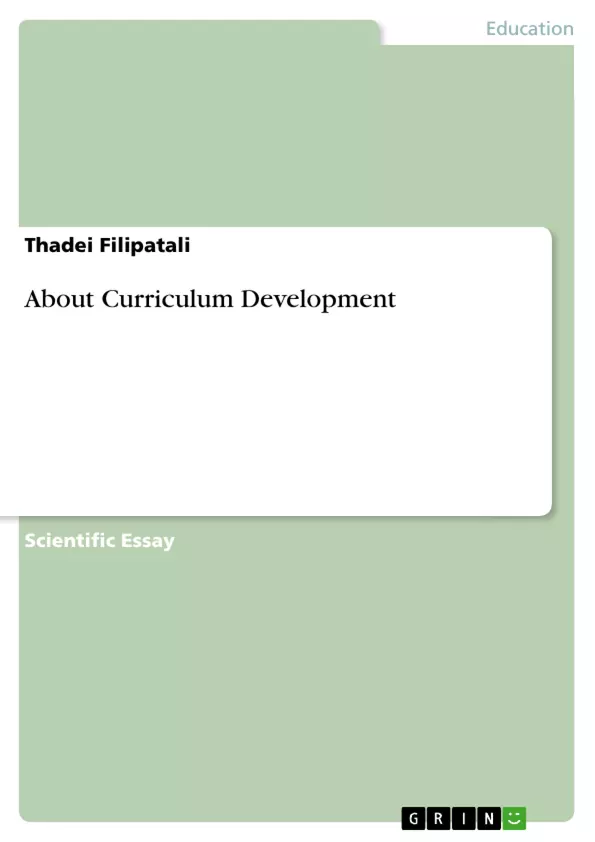Curriculum is the planned and guided learning experiences and intended outcomes,
formulated through systematic reconstruction of knowledge and experiences, under the
auspices of school, for the learners’ continuous and wilful growth in personal social
competence (Wiles and Bondi 1989 p.7). Marsh and Willis (1995 p.6) argue that the term
curriculum comes from the Latin root which means race course, that means to school
students, curriculum is the race to run. Pratt (1980) defines curriculum as an organised set of
formal education and/ or training intentions.
Inhaltsverzeichnis (Table of Contents)
- Introduction
- Curriculum Design
- Curriculum Planning
- Curriculum Development
- Role of Objectives in Curriculum Development
Zielsetzung und Themenschwerpunkte (Objectives and Key Themes)
This paper aims to provide a comprehensive overview of curriculum development, exploring its key concepts, defining its various aspects, and examining the significance of objectives in the process. The paper delves into the historical development of curriculum, highlighting its evolution from a race course analogy to a complex undertaking involving decision-making and planning. The author emphasizes the role of various disciplines, including psychology, sociology, and philosophy, in shaping curriculum development.
- Curriculum Design
- Curriculum Planning
- Curriculum Development
- The Role of Objectives in Curriculum Development
- The Importance of Disciplinary Influence on Curriculum Development
Zusammenfassung der Kapitel (Chapter Summaries)
- Introduction: This section introduces the concept of curriculum as a planned and guided learning experience, highlighting its role in fostering personal and social competence. It presents various definitions of curriculum from different scholars.
- Curriculum Design: This chapter explores the definition and components of curriculum design, focusing on the arrangement of elements such as aims, objectives, and learning activities. It emphasizes the importance of content organization and the two levels of development involved in curriculum design.
- Curriculum Planning: This section delves into the process of curriculum planning, emphasizing the significance of aligning means to educational ends. It discusses the challenges of curriculum planning and the need for flexibility in plans. Various definitions of curriculum planning are presented, highlighting its role in defining educational goals and engineering means to achieve them.
- Curriculum Development: This chapter provides a comprehensive overview of curriculum development, exploring its definition, process, and key influences. It emphasizes the complex nature of curriculum development, highlighting the various decision-making processes involved. It also highlights the contributions of different disciplines, such as psychology, sociology, and philosophy, to curriculum development.
- Role of Objectives in Curriculum Development: This section explores the significance of objectives in curriculum development. It defines objectives as specific changes to be brought about in learners, highlighting their role in shaping content selection, learning strategies, and evaluation processes. The author also discusses how objectives serve as criteria for selecting materials, outlining content, and developing instructional procedures.
Schlüsselwörter (Keywords)
The primary keywords and themes explored in this paper include curriculum design, curriculum planning, curriculum development, objectives, learning experiences, content organization, decision-making, instructional planning, disciplinary influences, psychology, sociology, and philosophy.
Frequently Asked Questions
What is the definition of curriculum used in this paper?
Curriculum is defined as the planned and guided learning experiences formulated to foster personal and social competence under the school's auspices.
What are the three main areas discussed regarding curriculum?
The paper focuses on Curriculum Design, Curriculum Planning, and Curriculum Development.
Why are objectives important in curriculum development?
Objectives serve as specific goals for learner changes and act as criteria for selecting materials, content, and instructional procedures.
What is the origin of the term "curriculum"?
The term comes from a Latin root meaning "race course," signifying the educational path or "race" that students must run.
Which disciplines influence the creation of a curriculum?
Curriculum development is shaped by various disciplines, including psychology, sociology, and philosophy.
What is the difference between curriculum design and planning?
Design focuses on the arrangement of elements like aims and activities, while planning focuses on engineering the means to achieve educational ends.
- Quote paper
- Thadei Filipatali (Author), 2013, About Curriculum Development, Munich, GRIN Verlag, https://www.grin.com/document/293647



